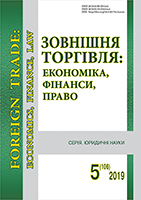Criteria for insanity of the subjects of the illegal act
DOI:
https://doi.org/10.31617/zt.knute.2019(106)11Keywords:
objectively unlawful act, insanity, diminished sanity, medical criterion of insanity, legal criterion of insanity., objectively unlawful act, insanity, diminished sanity, medical criterion of insanity, legal criterion of insanityAbstract
Background. The global European community demonstrates significant changes in the structure and dynamics of wrongdoing, which is accompanied by the recognition of the fundamental idea of the priority of human values. The rethinking of an objective assessment of the influence of a person's physical or mental state on his behavior is of particular importance.
Analysis of recent research and publications has shown that, despite the existence of some scientific advances, the important scientific and practical problem on determining the criterion of insanity of non-indictable subjects of objectively unlawful acts remains unresolved.
The aim of the article is to study comparatively cognitive norms of foreign states with respect to the criteria of insanity of non-indictable subjects of objectively unlawful acts.
Materials and methods. In the course of the research philosophical methods of cognition, general scientific and special methods used in interpreting the rules of law, conducting comparative legal analysis were used.
Results. The comparative-cognitive analysis of foreign states’ norms regarding the criteria of insanity of non-indictable subjects of objectively unlawful acts is presented. Understanding the categories «insanity» and «diminished sanity» is considered in Romano-German, religious and Far Eastern legal families. Based on the results of this study, a set of proposals has been developed that should be considered in Ukraine in order to improve the objectively unlawful act.
Conclusion. As a result of the analysis of the legislation of the countries of the separate legal systems of the world concerning the committing of illegal acts by non-indictable subjects, it is established that there is no clear concept of this category in the modern legislation of foreign states.
The experience of the states of the Romano-German legal family is interesting for Ukraine, since the legislation of the countries in question is the most grounded, logical and consistent and meets the realities of the requirements of the latest trends in the globalization of jurisprudence.
The prospects for further research are determined, in particular: study of the legislation of the countries that are part of the Anglo-American legal system, which regulates the criteria problem of insanity of non-indictable subjects of objectively unlawful acts, in order to comprehensively cover this issue taking into account the position, normative framework and case law of this legal family.
References
Goroh, O. P. (2019). Suchasni kryminal'no-pravovi problemy zvil'nennja vid pokarannja ta jogo vidbuvannja [Modern criminal-legal problems of release from punishment and its serving]. A. A. Muzyka (Ed.). Kyiv: Dakor [in Ukrainian].
Zajcev, O. V. (2015). Dejaki problemy vyznachennja formuly neosudnosti u kryminal'nomu pravi Ukrai'ny [Some problems of determining the formula of insanity in the criminal law of Ukraine]. Visnyk Asociacii' kryminal'nogo prava Ukrai'ny – Bulletin of the Association of Criminal Law of Ukraine. (Vol. 1 (4). (pp. 113-123) [in Ukrainian].
Ortyns'ka, N. V. (2017). Pravovyj status nepovnolitnih: teoretyko-pravove doslidzhennja [Juvenile legal status: a theoretical and legal study]. Doctor's thesis. L'viv: L'vivs'ka politehnika [in Ukrainian].
Plashovec'kyj, O. A. (2017). Kryminal'no-pravova dyferenciacija viku [Criminal legal differentiation of age]. Candidate's thesis. L'viv [in Ukrainian].
Polonka, I. A. (2017). Ob'jektyvno-protypravne dijannja: pidhid strukturno-kompleksnogo rozuminnja [Objective unlawful action: a structurally-complex understanding approach]. Pravo ta derzhavne upravlinnja – Law and public administration, 2, 17-25 [in Ukrainian].
Ugolovnyj kodeks Francii [The Penal Code of France]. (2002). L. V. Golovko (Ed.). (N. E. Krylova, Trans). SPb.: Jurid. Centr Press [in Russian].
Golovnenkov, P. V. (2016). Ugolovnoe ulozhenie Federativnoj Respubliki Germanii: nauchno-prakticheskij kommentarij i perevod teksta zakona [Criminal Code of the Federal Republic of Germany: scientific and practical commentary and translation of the text of the law]. (2nd ed.). Мoscow: Prospekt [in Russian].
Kryminal'nyj kodeks Korolivstva Ispanija [Criminal Code of the Kingdom of Spain]. 2016. V. L. Menchyns'kyj (Ed.). (O. V. Lishevs'ka, Trans). Kyiv: OVK [in Ukrainian].
Mohamed Al Awabdeh. (2005). History and prospect of Islamic Criminal Lawwith respect to the Human Rights. Dissertation zur Erlangung des akademischen Grades Dr.jur. Berlin [in English].
Amin Omar Ahmed Babiker (1999). Razvitie ugolovnogo zakonodatel'stva Sudana (Osnovnye instituty obshhej chasti) [Development of the criminal law of Sudan (Main institutions of the general part)]. Candidate’s thesis. Мoscow [in Russian].
Zakon ob ugolovnom prave Izrailja [The Israel Criminal Law Act]. (2005). (M. Dorfman, Trans). N. I. Macnev (Ed.). SPb.: Juridicheskij Centr Press [in Russian].
Ugolovnyj kodeks Japonii [Japanese Penal Code]. (2002). A. I. Korobeev (Ed.). SPb.: Juridicheskij centr Press [in Russian].
Ugolovnyj kodeks Kitajskoj Narodnoj Respubliki [Criminal Code of the People's Republic of China]. 2001. A. I. Korobeev (Ed.). (D. V. Vichikov, Trans). SPb.: Juridicheskij centr Press [in Russian].
Additional Files
Published
How to Cite
Issue
Section
License
Copyright (c) 2022 Foreign trade: Economics, Finance, Law

This work is licensed under a Creative Commons Attribution 4.0 International License.
This work is licensed under a Creative Commons Attribution 4.0 International (CC BY 4.0)







